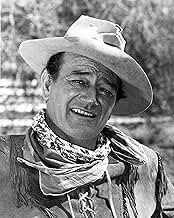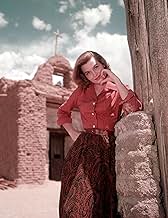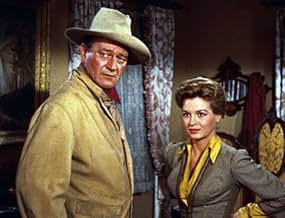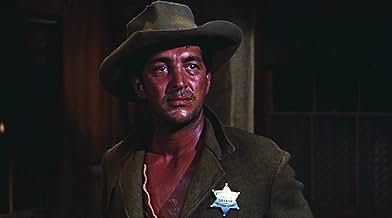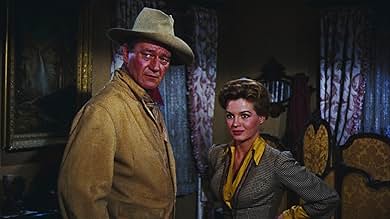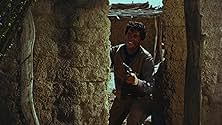Ein Kleinstadt-Sheriff im amerikanischen Westen schart einen Krüppel, einen Säufer und einen jungen Revolverhelden um sich, damit der Bruder des örtlichen Bösewichts nicht aus dem Gefängnis ... Alles lesenEin Kleinstadt-Sheriff im amerikanischen Westen schart einen Krüppel, einen Säufer und einen jungen Revolverhelden um sich, damit der Bruder des örtlichen Bösewichts nicht aus dem Gefängnis entkommen kann.Ein Kleinstadt-Sheriff im amerikanischen Westen schart einen Krüppel, einen Säufer und einen jungen Revolverhelden um sich, damit der Bruder des örtlichen Bösewichts nicht aus dem Gefängnis entkommen kann.
- Regie
- Drehbuch
- Hauptbesetzung
- Auszeichnungen
- 4 Gewinne & 5 Nominierungen insgesamt
- Carlos Robante
- (as Pedro Gonzalez-Gonzalez)
- Jake (Stage Driver)
- (Gelöschte Szenen)
- Harold
- (Gelöschte Szenen)
- Cowboy
- (Gelöschte Szenen)
- Barfly
- (Nicht genannt)
- Barfly
- (Nicht genannt)
- Charlie
- (Nicht genannt)
- Barfly
- (Nicht genannt)
- Bartender
- (Nicht genannt)
Empfohlene Bewertungen
No character empathises this more than Dean Martin's broken down drunk Dude. Nicknamed "Borachon" by the Mexicans (Borachon is Spanish for "Drunkard") Dude battles with the demons that drove him to drink as he desperately tried not to let down Sheriff Chance, John Wayne, who believes in him more than he believes in himself. Dude's pouring back of a glass of bourbon into the bottle is one of the most life affirming scenes ever committed to film.
Wayne never really does anything other than play John Wayne and Hawks spins on this playing with the ethos of the man. The same steadfast values that mean Wayne's Sheriff John T. Chance will not release the prisoner Joe Burdette back to his murderous gang leave him stiff and awkward in front of Angie Dickinson's love interest "Feathers" creating perhaps the quintessential John Wayne movie in which the Jules Furthman and Leigh Brackett's screenplay explores the depths of the ideals that Wayne stands for. This is a movie about not just about redemption, but about the reasons for a tough redemption in a World in which collapse and lawlessness are easier options.
And when Dude pours his Bourbon back, affirming that even though he cannot be the man he was but he can still be a good man, you will not be wishing it was film in bullettime.
Rio Bravo is a sprawling pressure cooker. For anyone not used to the pacing of older films, this is not the best place to begin. Uninitiated audiences are likely to find it boring--the plot is relatively simple, and they would likely have a difficult time remaining with Rio Bravo for its 2 hour and 21 minute running time. It's best to wait until one is acclimated to this kind of pacing, so as not to spoil the experience. The film is well worth it.
John Wayne was an enthralling paradox, and maybe no film better demonstrates why than Rio Bravo. He had almost delicate "pretty boy" looks and a graceful gait that were an odd contrast to his hulking height and status as the "action hero" of his day. He speaks little, and doesn't need to, although he is the star and thus the center of attention. He tends to have an odd smirk on his face. Wayne's performance here interestingly parallels the pacing and tenor of the film--that's not something that one sees very often, or at least it's not something that's very easy to make conspicuous.
And he's not the only charismatic cast member. Dean Martin, Ricky Nelson, Walter Brennan and Angie Dickinson are equally captivating. Even when the full blow-out action sequence begins (and that's not until about two hours into the film, although there are a few great shorter action scenes before that), the focus here is still on the interrelationships between these characters, with Brennan the continually funny comic foil, Nelson the suave, skilled youngster, Martin the complex and troubled but likable complement to Wayne, and Dickinson as the sexy, forward and clever love interest.
Director Howard Hawks seems to do everything right. He guides cinematographer Russell Harlan in capturing subtly beautiful scenery--like the mountains in the distance over the tops of some buildings, and a great sunrise shot--and asks for an atmospheric score (such as the repeated playing of Malaguena by a band in the background) that shows that plot points weren't the only element of the film that influenced John Carpenter (who partially based his Assault on Precinct 13 (1976) on this film). But most intriguing is probably Hawks' staging/blocking. You could easily make a study of just that aspect of the film. The characters are always placed in interesting places in the frame, and they're constantly moving in interesting ways throughout the small collection of buildings and streets that make up the town. There is almost a kind of performance art aspect to it. Wayne, for instance, repeatedly touches base at the jail, then picks up his rifle, circles around to the hotel and back, almost as if he's doing some kind of western Tai Chi.
Rio Bravo is nothing if not understated, and as such, it may take some adjustments from modern, especially younger, viewers. But it's a gem of a film, and worth watching and studying.
The main stars, John Wayne, Dean Martin, and Angie Dickinson all turn in the top-notch performances one would expect from them, and Rick Nelson is a very pleasant surprise as Colorado. It's two others that separate this movie from other Westerns, though.
Pedro Gonzales-Gonzales, as Carlos the hotel-keeper, is a breath of fresh air. His interplay with John Wayne's John T. Chance adds a touch of human reality to the movie that sets it apart.
Walter Brennan in his role as Stumpy, however, is the glue that holds the whole thing together and makes it work. His constant griping under his breath, his goading of Wayne, his dialogue with the prisoner and his general comic relief set Rio Bravo apart from any other Western and put it in a class of its own. Keenan Wynn in Eldorado doesn't even come close.
This is classic John Wayne at his finest. He is the great gunslinger facing insurmountable odds who takes on the bad guys with his brains, his determination, and his skills. Directed by Howard Hawks, this is just a great old fashion western. They even have Dean Martin and Ricky Nelson sing-along. Angie Dickinson plays the romantic lead. Sure, it is cliché. The good guys always win in the end. But there's nothing wrong with that.
Wusstest du schon
- WissenswertesHoward Hawks did not want to cast Ricky Nelson, whom he considered to be both too young and too lightweight, and deliberately gave him the fewest possible number of lines for a third-billed star. However, he later admitted that having Nelson's name on the poster had probably added $2 million to the film's box office performance.
- PatzerAt night when Dude and Chance are making their rounds, the camera follows Dude as he walks briefly off the set. A huge concrete pillar that he walks past can be seen.
- Zitate
Feathers: I thought you were never going to say it.
John T. Chance: Say what?
Feathers: That you love me.
John T. Chance: I said I'd arrest you.
Feathers: It means the same thing, you know that.
- VerbindungenEdited into La classe américaine (1993)
Top-Auswahl
Details
Box Office
- Weltweiter Bruttoertrag
- 27.763 $
- Laufzeit
- 2 Std. 21 Min.(141 min)



